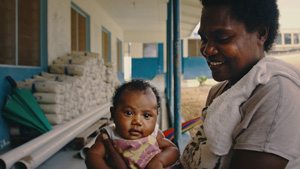Empowering Choices: Communicating family planning knowledge and behaviours in Kiribati
While Kiribati has seen a lot of progress towards improving sexual and reproductive health and rights (SRHR) in recent years many challenges remain. Rates of modern contraceptive use remain at some of the lowest levels in the region and unmet need for contraceptives is high, especially for young women and women with disabilities and many couples are having more children than they would like to have.
 When women and girls can exercise their right to make informed decisions on when and how often to become pregnant, they enjoy better health, can achieve higher levels of education, expand their workforce opportunities, and generate more income for their families. This triggers a cycle of prosperity that carries well into future generations. This cycle is further strengthened when men can support family planning decisions.1
When women and girls can exercise their right to make informed decisions on when and how often to become pregnant, they enjoy better health, can achieve higher levels of education, expand their workforce opportunities, and generate more income for their families. This triggers a cycle of prosperity that carries well into future generations. This cycle is further strengthened when men can support family planning decisions.1
Nossal Institute has been working with UNFPA to support key government and non-government organisations in Kiribati to develop a Behaviour Change and Communication (BCC) strategy to increase demand for family planning services among men, women and young people.
Behaviour Change Communication plays an important role in increasing knowledge, influencing attitudes and changing practices of men, women and youths to make informed decisions on their reproductive rights and family planning choices. By ensuring every pregnancy is wanted and every pregnancy is safe, the population of Kiribati can continue to build their social and economic livelihoods.
The Nossal Institute team are working with key stakeholders in Kiribati to understand current barriers to uptake of family planning, iand define key messages and communication channels that will influence change in behaviours and attitudes towards family planning and modern contraceptive use.
A BCC strategy has been developed in collaboration with key stakeholders in Kiribati, including the Ministry of Health and Medical Services (MHMS) Womens division, the Ministry of Women, Youth, Sports and Social Affairs (MWYSSA) and the Ministry of Education, as well as non-government organisations and civil society groups and the Nossal Institute. A BCC taskgroup has been formed and theyrecently endorsed the strategy at a two day workshop in Kiribati. The Task group can now begin to work with ABC-ID on priority implementation activities and media products to broadcast family planning messages across the country.
The Nossal team will continue to work in unmet need for family planning across the Pacific by supporting the development of locally tailored behaviour change and family planning strategies in Vanuatu and the Solomon Islands.
This project has been administered through UNFPA, as part of the DFAT-funded Transformative Agenda. The Transformative Agenda program is aimed at boosting the significant investments in improving Sexual and Reproductive Health across six priority countries including Kiribati.